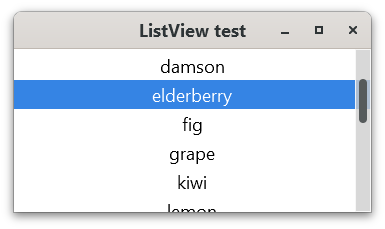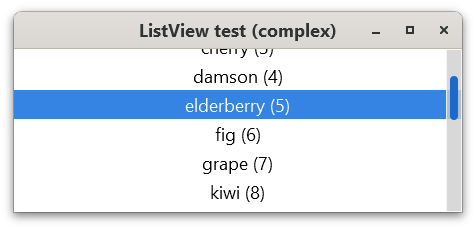As a digression to my experiments with GTK4 and Haskell, inspired by a question at the Haskell Community, I looked at list views.
A list view brings together a selection model and a list item factory. A selection model adds support for selection to a list model. A list item factory creates widgets for the list items of a list model. The properties of a list item include an item from the list model, the position of the item in the list model, and the child widget used to display the item.
A list of strings
A simple list model is a value of type StringList. Its items are values of type StringObject. A simple selection model is a value of type SingleSelection.
An example of a list item factory is a value of type SignalListItemFactory. It emits signals, such as setup and bind, to manage list items.
|
1 2 3 4 5 6 7 8 9 10 11 12 13 14 15 16 17 18 19 20 21 22 23 24 25 26 27 28 29 30 31 32 33 34 35 36 37 38 39 40 41 42 43 44 45 46 47 48 49 50 51 52 53 54 55 56 57 58 59 60 61 62 63 64 65 66 67 68 69 70 71 72 73 74 75 76 77 78 79 80 81 82 83 84 85 86 87 88 89 |
{-# LANGUAGE ImplicitParams #-} {-# LANGUAGE OverloadedLabels #-} {-# LANGUAGE OverloadedRecordDot #-} {-# LANGUAGE OverloadedStrings #-} module Main ( main ) where import Control.Monad ( void ) import Control.Monad.Extra ( whenJust ) import Data.GI.Base ( AttrOp (..), castTo, get, new, on, set ) import Data.Text ( Text ) import qualified GI.Gtk as Gtk activate :: Gtk.Application -> IO () activate app = do stringList <- Gtk.stringListNew (Just exampleList) singleSelection <- Gtk.singleSelectionNew (Just stringList) signalListItemFactory <- Gtk.signalListItemFactoryNew scrolledWindow <- Gtk.scrolledWindowNew let setupListItem :: Gtk.SignalListItemFactorySetupCallback setupListItem o = do mListItem <- castTo Gtk.ListItem o whenJust mListItem $ \listItem -> do label <- new Gtk.Label [] set listItem [ #child := label ] let bindListItem :: Gtk.SignalListItemFactoryBindCallback bindListItem o = do mListItem <- castTo Gtk.ListItem o whenJust mListItem $ \listItem -> do mItem <- get listItem #item whenJust mItem $ \item -> do mStringObject <- castTo Gtk.StringObject item whenJust mStringObject $ \stringObject -> do mWidget <- get listItem #child whenJust mWidget $ \widget -> do mLabel <- castTo Gtk.Label widget whenJust mLabel $ \label -> do string <- get stringObject #string set label [ #label := string ] void $ on signalListItemFactory #setup setupListItem void $ on signalListItemFactory #bind bindListItem listView <- Gtk.listViewNew (Just singleSelection) (Just signalListItemFactory) set scrolledWindow [ #child := listView ] window <- new Gtk.ApplicationWindow [ #application := app , #title := "ListView test" , #child := scrolledWindow , #defaultHeight := 200 ] window.show exampleList :: [Text] exampleList = [ "apple" , "banana" , "cherry" , "damson" , "elderberry" , "fig" , "grape" , "kiwi" , "lemon" , "mango" , "nectarine" , "orange" , "peach" , "quince" , "raspberry" , "strawberry" , "tangerine" , "watermelon" ] main :: IO () main = do app <- new Gtk.Application [ #applicationId := "com.pilgrem.testListView" , On #activate (activate ?self) ] void $ app.run Nothing |
Following a suggestion by Barry Fishman, an alternative to nested whenJust is the use of MaybeT, as follows:
|
1 2 3 4 5 6 7 8 9 10 |
bindListItem :: Gtk.SignalListItemFactoryBindCallback bindListItem o = void $ runMaybeT $ do listItem <- MaybeT $ castTo Gtk.ListItem o item <- MaybeT $ get listItem #item stringObject <- MaybeT $ castTo Gtk.StringObject item widget <- MaybeT $ get listItem #child label <- MaybeT $ castTo Gtk.Label widget liftIO $ do string <- get stringObject #string set label [ #label := string ] |
The result was as follows:

A list of values of another type
A more complex list model is a value of type GI.Gio.Objects.ListStore, provided by the gi-gio package. Two key functions are:
|
1 2 3 4 5 6 7 8 9 10 11 12 13 14 15 |
listStoreNew :: (HasCallStack, MonadIO m) => GType -- ^ The GType of all items. -> m ListStore listStoreInsert :: (HasCallStack, MonadIO m, IsListStore a, IsObject b) => a -- ^ A ListStore. -> Word32 -- ^ The position at which to insert the new item. -> b -- ^ The new item. -> m () |
All the items in the list model are of the same type, which must be an instance of type class IsObject and, consequently, an instance of type classes GObject, TypedObject and HasParentTypes. Types that are instances of GObject are specified with newtype and have a data constructor of type ManagedPtr o -> o.
ParentTypes is an open indexed type family, with a kind of a list of concrete types ([Type]):
|
1 |
type family ParentTypes a :: [Type] |
Open indexed type families are provided by the TypeFamilies language extension. The DataKinds language extension provides lists at the type level, with the syntax [] (empty list) and [Type]
Class TypedObject promises glibType :: IO GType, which is implemented using registerGType. That, in turn, requires the type to be an instance of DerivedGObject.
|
1 2 3 4 5 6 7 8 9 10 11 12 13 14 15 16 17 18 19 20 21 22 23 24 25 26 27 28 29 30 31 32 33 34 35 36 37 38 39 40 41 42 43 44 45 46 47 48 49 |
{-# LANGUAGE DataKinds #-} {-# LANGUAGE OverloadedStrings #-} {-# LANGUAGE TypeFamilies #-} module Data.MyTypeObject ( MyTypeObject (..) , MyTypePrivate (..) ) where import Data.GI.Base ( GObject, ManagedPtr, TypedObject (..), glibType ) import Data.GI.Base.GObject ( DerivedGObject (..), registerGType ) import Data.GI.Base.Overloading ( HasParentTypes, ParentTypes ) import GI.GObject ( Object ) import Data.Text ( Text ) newtype MyTypeObject = MyTypeObject (ManagedPtr MyTypeObject) type instance ParentTypes MyTypeObject = '[Object] instance HasParentTypes MyTypeObject instance TypedObject MyTypeObject where glibType = registerGType MyTypeObject instance GObject MyTypeObject data MyTypePrivate = MyTypePrivate { fruit :: Maybe Text , count :: Maybe Int } instance DerivedGObject MyTypeObject where type GObjectParentType MyTypeObject = Object type GObjectPrivateData MyTypeObject = MyTypePrivate objectTypeName = "MyTypeObject" objectClassInit _ = pure () objectInstanceInit _ _ = pure $ MyTypePrivate { fruit = Nothing , count = Nothing } objectInterfaces = [] |
The modified program is:
|
1 2 3 4 5 6 7 8 9 10 11 12 13 14 15 16 17 18 19 20 21 22 23 24 25 26 27 28 29 30 31 32 33 34 35 36 37 38 39 40 41 42 43 44 45 46 47 48 49 50 51 52 53 54 55 56 57 58 59 60 61 62 63 64 65 66 67 68 69 70 71 72 73 74 75 76 77 78 79 80 81 82 83 84 85 86 87 88 89 90 91 92 93 94 95 96 97 98 99 100 101 102 103 104 105 106 107 108 109 110 111 112 113 114 115 116 117 |
{-# LANGUAGE ImplicitParams #-} {-# LANGUAGE OverloadedLabels #-} {-# LANGUAGE OverloadedRecordDot #-} {-# LANGUAGE OverloadedStrings #-} module Main ( main ) where import Control.Monad ( void ) import Control.Monad.Extra ( whenJust ) import Control.Monad.IO.Class ( MonadIO (..) ) import Control.Monad.Trans.Maybe ( MaybeT (..) ) import Data.MyTypeObject import Data.GI.Base ( AttrOp (..), castTo, get, new, on, set ) import Data.GI.Base.GObject ( gobjectGetPrivateData, gobjectSetPrivateData , registerGType ) import Data.Text ( Text, pack ) import GI.GObject ( Object, toObject ) import qualified GI.Gio as Gio import qualified GI.Gtk as Gtk activate :: Gtk.Application -> IO () activate app = do gType <- registerGType MyTypeObject listStore <- Gio.listStoreNew gType exampleList <- exampleObjects Gio.listStoreSplice listStore 0 0 exampleList singleSelection <- Gtk.singleSelectionNew (Just listStore) signalListItemFactory <- Gtk.signalListItemFactoryNew scrolledWindow <- Gtk.scrolledWindowNew let setupListItem :: Gtk.SignalListItemFactorySetupCallback setupListItem o = do mListItem <- castTo Gtk.ListItem o whenJust mListItem $ \listItem -> do label <- new Gtk.Label [] set listItem [ #child := label ] let bindListItem :: Gtk.SignalListItemFactoryBindCallback bindListItem o = void $ runMaybeT listItem <- MaybeT $ castTo Gtk.ListItem o item <- MaybeT $ get listItem #item myTypeObject <- MaybeT $ castTo MyTypeObject item widget <- MaybeT $ get listItem #child label <- MaybeT $ castTo Gtk.Label widget liftIO $ do myTypePrivate <- gobjectGetPrivateData myTypeObject let string = case myTypePrivate of MyTypePrivate (Just f) (Just c) -> f <> " (" <> pack (show c) <> ")" MyTypePrivate (Just f) Nothing -> f MyTypePrivate _ _ -> "" set label [ #label := string ] void $ on signalListItemFactory #setup setupListItem void $ on signalListItemFactory #bind bindListItem listView <- Gtk.listViewNew (Just singleSelection) (Just signalListItemFactory) set scrolledWindow [ #child := listView ] window <- new Gtk.ApplicationWindow [ #application := app , #title := "ListView test (complex)" , #child := scrolledWindow , #defaultHeight := 200 ] window.show exampleFruit :: [Text] exampleFruit = [ "apple" , "banana" , "cherry" , "damson" , "elderberry" , "fig" , "grape" , "kiwi" , "lemon" , "mango" , "nectarine" , "orange" , "peach" , "quince" , "raspberry" , "strawberry" , "tangerine" , "watermelon" ] exampleCount :: [Int] exampleCount = [1 .. 18] exampleObjects :: IO [Object] exampleObjects = mapM (toObject =<<) exampleMyType where exampleMyType = zipWith go exampleFruit exampleCount go f c = do myTypeObject <- new MyTypeObject [] gobjectSetPrivateData myTypeObject $ MyTypePrivate { fruit = Just f , count = Just c } pure myTypeObject main :: IO () main = do app <- new Gtk.Application [ #applicationId := "com.pilgrem.testListView.complex" , On #activate (activate ?self) ] void $ app.run Nothing |
The result was as follows:
